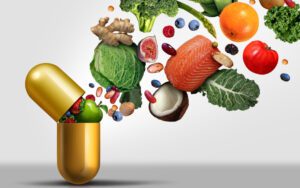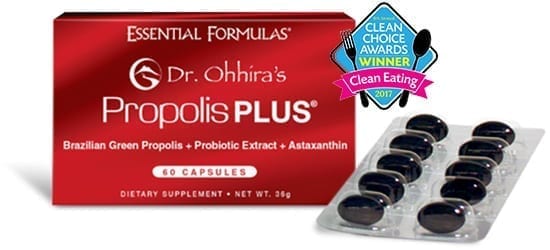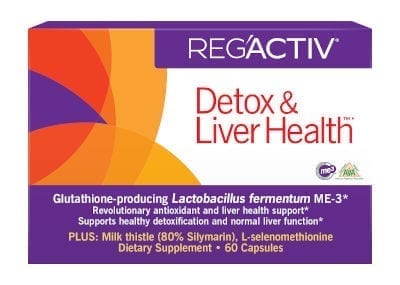February, 2017
By Ross Pelton, Pharmacist
Scientific Director/Essential Formulas
Proton Pump Inhibitors (PPIs)
And How Dr. Ohhira’s Probiotics Can Help
Proton pump inhibitors (PPIs) are one of the highest-selling classes of drugs of all time with sales approaching $10 billion per year. PPIs, which are commonly used to treat the symptoms of gastroesophageal reflux disease (GERD), heartburn and gastric ulcers, belong to a class of medications that I refer to as microbiome-disrupting drugs.
For years, the medical profession has believed that PPIs were completely safe for most people. The FDA was also convinced that PPIs were safe because they authorized taking PPIs off prescription drug status and allowed them to become available as OTC drugs. This enabled millions more Americans to start taking PPIs regularly without any medical oversight. As a result, PPIs are taken regularly by over 15 million Americans, which makes them the third most commonly prescribed class of drugs. The names of the available PPI drugs are:
Nexium (esomeprazole), Dexilant (dexlansoprazole), Prevacid (lansoprazole), Prilosec & Prilosec OTC (omeprazole), Zegerid & Zegerid OTC (omeprazole + sodium bicarbonate), Protonix (pantoprazole), AcipHex (rabeprazole).
PPI Side Effects: However, some deep concerns are starting to cloud the reputation of PPIs. Recent studies suggest that the widespread use of PPIs is contributing to a dramatic rise in the incidence of serious intestinal disorders such as small intestinal bacterial overgrowth (SIBO)[1] and Clostridium difficile (C. diff) antibiotic-resistant infections.[2] The results from numerous clinical trials report that the use of PPIs causes a substantial decrease in bacterial diversity, which results in profound negative changes in the gut microbiome.[3] This has prompted some researchers to state that proton pump inhibitors may be as bad for the gut as antibiotics.[4]
Proton-pump inhibitors (PPIs) are strong suppressors of acid secretion in the stomach. This alters the acid/base balance in the intestinal tract, creating an environment that encourages the growth of bad bacteria and the development of an unhealthy gut microbiome.[5] It is known that PPIs increase the risks of developing dysbiosis with accompanying symptoms of bloating, flatulence, abdominal pain and diarrhea.[6]
There are several other side effects associated with PPI meds that are usually not explained to patients. First, suppressing the secretion of stomach acid inhibits the digestion of dietary protein, which allows incompletely digested protein to pass from the stomach into the small intestine. This substantially increases the risk of developing food allergies.[7]
PPI Nutrient Depletions & Side Effects
In my book The Drug-Induced Nutrient Depletion Handbook,[8] I present studies which show that PPIs cause the depletion of vitamin B12, vitamin C, folate and the minerals calcium, iron, magnesium and zinc. If these depletions persist for an extended period, other health problems can develop. For example, vitamin B12 depletion can cause cognitive decline and irreversible nerve damage[9] and magnesium deficiency increases the risk of heart attacks[10] and strokes.[11]
Folate Deficiency & Pregnancy:
I am especially concerned about PPI-induced folate depletion in younger women. If a woman is folate deficient when she becomes pregnant, there is a much greater risk of preterm delivery, low birth weight infant and the infant may have low iron levels well into its first year of life.[12] More serious outcomes from folate deficient pregnancies include increased risk of spontaneous abortions[13] or giving birth to an infant with congenital heart defects of birth defects such as spina bifida.[14]
The WEB site for The National Campaign to Prevent Teen and Unplanned Pregnancy states the following alarming statistics:
- In women aged 15-44, approximately 45% of pregnancies are unplanned
- Among unmarried women aged 20-29, approximately 69% of pregnancies are unplanned
Because folate deficiency dramatically increases the risks of serious pregnancy problems, I strongly encourage all women who can become pregnant to have their folate levels checked BEFORE becoming pregnant. The following classes of medication also deplete folate: oral contraceptives, antibiotics, anticonvulsants, non-steroidal anti-inflammatory drugs, acid suppressing drugs and metformin, which is the most commonly prescribed drug for type 2 diabetes. Hence, it is possible for a woman to be taking 2 or 3 medications at the same time which all deplete folate.
Weakened Immune System:
The following nutrients depleted by PPIs are critical for proper functioning of the immune system: vitamin C, iron and zinc.[15] Direct evidence that people taking PPI medications have a weakened immune system was reported in recent study published in June 2015. In a meta-analysis review of 26 studies involving over 6 million people, it was determined that individuals taking PPIs had a 1.5 times greater risk of developing pneumonia. The authors also stated that the highest risk of developing pneumonia was within the first 30 days after beginning PPI therapy.[16]
Proton Pump Inhibitors (PPIs) are one of the most commonly prescribed classes of drugs. Recent reports state that over 15 million Americans are taking PPI prescription medications, making PPIs over a $10 billion dollar per year industry. And these figures are substantially understated because they do not take into account over-the-counter sales.
Dr. Ohhira’s Probiotics To The Rescue
By suppressing acid production, PPIs make the intestinal environment more alkaline which disrupts your microbiome and increases the likelihood that bad bacteria and yeasts will proliferate. Most commercial probiotic products provide capsules or tablets that just contain probiotic bacteria. Those probiotic bacteria have to struggle because they are entering a “bad” environment (too alkaline) and they will have to fight (compete against) a daunting army of bad bacteria.
Rebuilding The Microbiome:
For a commercial probiotic to be successful in correcting dysbiosis/intestinal problems, the bacteria must reproduce and proliferate, fight the “bad guys” and produce and excrete compounds like short-chain fatty acids which will gradually convert the GI environment to a slightly more acidic condition which is favorable for the probiotic growth and suppresses the growth of bad bacteria.
Probiotics + Prebiotics + Postbiotics™:
Dr. Ohhira’s production process starts by supplying 12 strains of bacteria with a wide range of organically grown foods. The bacteria then to grow in large fermentation vats for three years (Original Formula) to five years (Professional Formula). During the multi-year fermentation process the bacteria produce a wide range of bioactive compounds that we refer to as postbiotic™ metabolites. Another term that is being used to describe these compounds is fermentation-derived metabolites. A major category of the postbiotic™ compounds produced are classified as short-chain fatty acids (SCFAs), which include acetic acid, lactic acid, propionic acid and butyric acid.[17],[18] These are the all-important acids, produced by probiotic bacteria, which will convert the microbiome from a pathological alkaline environment back to its optimal acidic state.
-
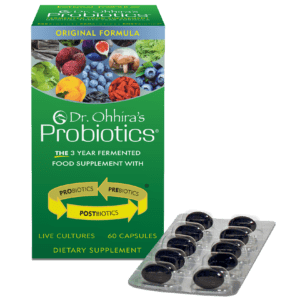 Dr. Ohhira’s® Probiotic Supplements$13.95 – $89.95
Dr. Ohhira’s® Probiotic Supplements$13.95 – $89.95 -
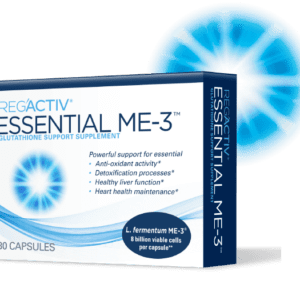 Reg´Activ Essential ME-3$39.95
Reg´Activ Essential ME-3$39.95 -
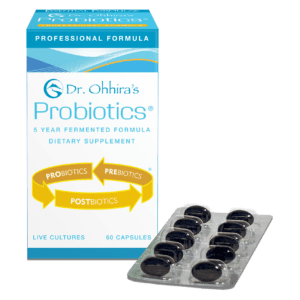 Dr. Ohhira’s® Probiotics Professional Formula$39.95 – $129.65
Dr. Ohhira’s® Probiotics Professional Formula$39.95 – $129.65
Dr. Ohhira’s vs The Others
Short-Chain Fatty Acids (SCFAs): Other products just provide bacteria. However, when Dr. Ohhira’s Probiotics™ are encapsulated, the bacteria have already been working for years during the fermentation process producing SCFAs and many other bioactive postbiotic™ metabolites. Each capsule of Dr. Ohhira’s Probiotics™ provides a rich supply of SCFAs which dramatically accelerates the process of recreating the healthy acid/base balance in the microbiome that supports the growth of probiotics and inhibits the growth of the bad bacteria.
Bacteriocins (Natural Antibiotics): Bacteriocins are a large class of protein-like compounds produced by different strains of probiotic bacteria. They are also referred to as called bioprotective agents. Because they exert potent antimicrobial activity against gut pathogens, bacteriocins they are a critically important part of the human immune system.[19]
Short-chain fatty acids and bacteriocins are just the proverbial “tip of the iceberg” in terms of the postbiotic™ metabolites that probiotic bacteria produce in the human GI tract. However, these two classes of postbiotic metabolites play critically important roles in the regulation of the immune system and the maintenance of a healthy microbiome.
Other probiotic products just contain probiotic bacteria. Every dose of Dr. Ohhira’s Probiotics contains probiotic bacteria, prebiotic foods, and postbiotic metabolites such as short-chain fatty acids and bacteriocins. This is why Dr. Ohhira’s Probiotics work faster and more efficiently to rebuild and/or maintain a healthy microbiome.
This is The Dr. Ohhira’s Difference
Over 99% of the DNA in your body is the DNA of your bacteria
Your microbiome regulates your physical & emotional wellbeing
Your microbiome is one of your most important assets
Be kind to your 100 trillion friends…!!!
Take Dr. Ohhira’s Probiotics To Create and Maintain a Healthy Microbiome
References
[1] Lo WK, Chan WW. Proton pump inhibitor use and the risk of small intestinal bacterial overgrowth: a meta-analysis. Clin Gastroenterol Hepatol. 2013 May;11(5):483-90.
[2] McDonald EG, et al. Continuous Proton Pump Inhibitor Therapy and the Associated Risk of Recurrent Clostridium Difficile Infection. JAMA Intern Med. 2015 May;175(5):784-91.09iu
[3] Imhann F., Proton pump inhibitors affect the gut microbiome. Gut. 2016 May;65(5):740-48.
[4] Herron, NJ. Proton pump inhibitors may be as bad for the gut as antibiotics. Jan. 21, 2016. www.theguthealthprotocol.com
[5] Clooney AG, et al. A Comparison of the Gut Microbiome Between Long-term Users and Non-users of Proton Pump Inhibitors. Alliment Pharmacol Ther. 2016;43)9):974-984.
[6] Compare, D. et al. Effects of long-term PPI treatment on producing bowel symptoms and SIBO. Eur J Clin Invest. 2011 Apr;41(4): 380–86.
[7] Untersmayr E, Jensen-Jarolim E. The role of protein digestibility and antacids on food allergy outcomes. J Allergy Clin Immunol. 2008 Jun;121(6):1301-1310.
[8] Pelton R. The Drug-Induced Nutrient Depletion Handbook, 2nd ed. (Lexi-Comp, 2001)
[9] Heidelbaugh JJ. Proton pump inhibitors and risk of vitamin and mineral deficiency: evidence and clinical implications. Ther Adv Drug Saf. 2013 Jun:4(3):125-133.
[10] Shah NH, et al. Proton Pump Inhibitor Usage and the Risk of Myocardial Infarction in the General Population. PLoS One. 2015 Jun 10;10(6):e0124653.
[11] Sehested TS, et al. Proton Pump Inhibitor Use Increases the Associated Risk of First-Time Ischemic Stroke. A Nationwide Cohort Study. Circulation. 2016;134:A18462.
[12] Allen LH. Anemia and iron deficiency: effects on pregnancy outcome. Am J Clin Nutr. May 2000;71(5):1280s-128
[13] George L, et al. Plasma Folate Levels and Risk of Spontaneous Abortion. JAMA. 2002 Oct 16;288(15):1867-1873.
[14] Czeizel AE, et al. Folate Deficiency and Folic Acid Supplementation: The Prevention of Neural-Tube Defects and Congenital Heart Defects. Nutrients. 2013;5(11):4760-4775.
[15] Wintergerst ES, et al. Contribution of Selected Vitamins and Trace Elements to Immune Function. Ann Nutr Metab 2007 Sept;51:301-323.
[16] Lambert AA, et al. Risk of Community-Acquired Pneumonia with Outpatient Proton-Pump Inhibitor Therapy: A Systemic Review and Meta-Analysis. PLoS One. 2015 Jun 4;10(6):e0128004.
[17] Licciardi PV, et al. Epigenome targeting by probiotic metabolites. Gut Pathogens. 2010 Dec 14;2(1):24.
[18] Quinto, EJ, et al. Probiotic Lactic Acid Bacteria: A Review. Food and Nutrition Sciences. 2014 Aug 12;5:1765-1775.
[19] Gillor O. The dual role of bacteriocins as anti- and probiotics. Appl Microbiol Biothchnol. 2008 Oct 14;81:591.


